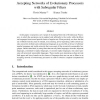Free Online Productivity Tools
i2Speak
i2Symbol
i2OCR
iTex2Img
iWeb2Print
iWeb2Shot
i2Type
iPdf2Split
iPdf2Merge
i2Bopomofo
i2Arabic
i2Style
i2Image
i2PDF
iLatex2Rtf
Sci2ools
161
click to vote
AFL
2011
2011
Accepting Networks of Evolutionary Processors with Subregular Filters
In this paper, we propose a new variant of Accepting Networks of Evolutionary Processors, in which the operations can be applied only arbitrarily to the words, while the filters are languages from several special classes of regular sets. More precisely, we show that the use of filters from the class of ordered, non-counting, power-separating, suffix-closed regular, union-free, definite and combinational languages is as powerful as the use of arbitrary regular languages and yields networks that can accept all the recursively enumerable languages. On the other hand, by using filters that are only finite languages, monoids, nilpotent languages, commutative regular languages, or circular regular languages, one cannot generate all recursively enumerable languages. These results seem interesting as they provide both upper and lower bounds on the classes of languages that one can use as filters in an accepting network of evolutionary processors in order to obtain a complete computatio...
Related Content
| Added | 12 Dec 2011 |
| Updated | 12 Dec 2011 |
| Type | Journal |
| Year | 2011 |
| Where | AFL |
| Authors | Florin Manea, Bianca Truthe |
Comments (0)

